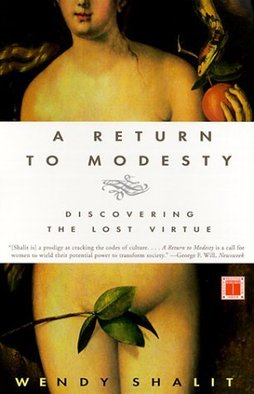 I recently finished reading Wendy Shalit's A Return to Modesty: Discovering the Lost Virtue. It was interesting. A lot of things jumped out immediately. For starters, the book is almost twenty years old and it definitely feels dates at points. She references pop culture quite a lot and everything surrounding date rape, gang rape, hazing, cat-calling, etc. reveals the book's age. Another point of interest is that Shalit is Jewish. Though I don't know where she is religiously now, at the time she wrote the book, she was not Orthodox, sort of. She is definitely enamored with many things stemming from Orthodox Judaism, but she never centers herself within it. As a Christian, this makes her voice really interesting since it's hard to map her ideas over one-to-one with a lot of what is said within conservative Christianity. Lastly, she is overly confident that what she says are obvious to womankind. Her book takes that tone of "all-people-secretly-know-this-and-when-it's-brought-into-the-light-they-will-rejoicingly-forsake-their-ways" that I find so irritating. Most people think they are acting consistently, logically, and morally, so I find any argument unconvincing that assumes people are simply blind. Yet, at the end of the day, I have to give it to Shalit. She wrote a book about modesty that is actually philosophically engaging. How many women exist that can claim that? I disagreed with her on quite a lot, but I would recommend anyone interested in thinking about the topic of modesty to read this book. Unlike just about any conversation I've heard on the topic, Shalit does not stoop to the level of bikinis and yoga pants. Instead, she asks America to engage the topic as one with philosophical depth. Unlike so many of the Evangelical debates that get stuck in the corner of male lust and whether or not women have a role to play in taking responsibility for such lust, Shalit addresses modesty as it actually should be addressed - as a sexual virtue. Her intended audience is not mother's trying to protect teenage boys from themselves or men who don't know how to keep their eyes off their friends' wives; rather, Shalit is writing to the completely secular female college grad who has spent her adult life sleeping around. If my memory serves me right, Shalit doesn't address clothing hardly at all. What she does address is the cultural, ethical, and philosophical milieu in which we live that tells young women they have nothing to protect sexually. The core of Shalit's argument is that modesty is essentially about privacy. Modesty is about maintaining the right to keep to one's self what one chooses. Connected to this is the natural right to make a big deal out of our sexual selves, and our sexual activity. In Shalit's mind, the the loss of modesty in Western society started with the reduction of the gravity of sex. She argues that women naturally treat sex as a big deal and modesty is our natural desire to protect what we believe to be important. Anything that trivializes or reduces the importance of sex, anything that tells women it is "no big deal" is a direct attack on a woman's right to protect her sexual self. Shalit meticulously argues that this is what is under attack in our society today. From classroom sex ed that forces young boys and girls to discuss their development and activity publicly to the common idea that women struggle with "hang ups" sexually if they do not respond in kind to men, Shalit argues that women today have been stripped of their natural tendency to modesty. By telling young teens to be casual and open about their sexual world, particularly by telling young women not to care so much about romantic notions concerning sex, our society is harming women's natural tendencies to protect themselves. Shalit gets a lot wrong, especially in her historical analysis and her romanticization of gender relations in the past, but the Evangelical world would greatly benefit from thinking about modesty along Shalit's lines of thought. In the end, her analysis is right. Modesty is ultimately not about preventing men from committing certain sexual sins. Modesty is about much more fundamental issues. However it is culturally defined, modesty is about the basic right and need of a woman to keep her sexual self as her own, bequeathing the right to share in it only to the beloved of her choosing. Despite all of the talk and hoopla about a woman's body belonging to herself, Shalit demonstrates that the Western world is increasingly and steadily redefining its sexual ethic to establish women's bodies as public entities. In the Evangelical world, all of our arguments about bikinis and yoga pants echo such changes. What we need is not detailed arguments about particular items of clothing, but rather a reexamination of some of the most basic principles. The question is not whether we as women are protecting our brothers, but rather whether we as women are keeping what we want to ourselves? ~ Hannah
0 Comments
Leave a Reply. |
Archives
October 2018
Categories
All
|
